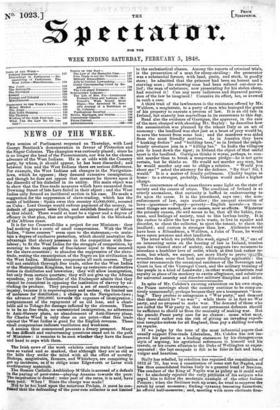NEWS OF THE WEEK.
THE session of Parliament reopened on Thursday, with Lord George Bentinck's demonstration in favour of Protection and the Sugar Colonies. The champion was curiously placed ; since he is no longer the bead of the Protectionists, nor was he the chosen advocate of the West Indians. He is at odds with the Country party, by whom, it should appear, he has been discarded ; and between him and the West Indians there are serious differences. For example, the West Indians ask changes in the Navigation- laws, which he opposes ; they demand extensive immigration, and though he does not oppose that measure he throws upon it the discredit of his disbelief in its utility. His main object was to show that the Free-trade measures which have emanated from Downing Street of late have failed in their object ; and the West Indies only formed an incidental section in his case. He made a suggestion for the suppression of slave-trading, which has the merit of boldness : Spain owes this country 45,000,000/., secured on Cuba : Lord George would enforce payment of the money, in default of payment seize Cuba, and establish freedom of labour in that island. There would at least be a vigour and a degree of efficacy in that plan, that are altogether missed in the blockade of the African coast.
It is far too Cromwell-like a project for our Ministers : they had nothing but a cento of small compromises. With the West Indies, Q0 three courses " seem open to the statesman,—to main- tain adegree of exclusive protection, which should neutralize the advantage that slavery possesses in the competition with free- labour ; to fit the West Indies for the struggle of competition, by securing to them supplies of free-labour equal to those secured for the slave-countries ; to abandon the suppression of the slave- trade, resting the emancipation of the Negro on his civilization in the West Indies. Ministers compromise all such courses. They will not establish thorough free trade, either for the West Indies or the Metropolitan Kingdom, but keep up restraints or distinctive duties in distilleries and breweries; they will allow immigration, but only from certain quarters; they will not give up the African squadron, yet the Chancellor of the Exchequer admits that they cannot be consistent in opposing the institution of slavery by ex- cluding its produce. They propound a set of small measures,— inquiry, because it is supererogatory and useless; the limited use of molasses for distillation ; a change in the Navigation-laws ; the advance of 200,000/. towards the expenses of immigration ; postponement of the repayment of an old loan, and a chari- table aid to Tobago for damage inflicted by the elements. There is to be no free trade, no unrestricted immigration, no adherence to Anti-Slavery plans, no abandonment of Anti-Slavery plans. Sir Charles Wood is only clear on one point—that free trade against the West Indies is good for the English revenue. These small compromises indicate vacillation and weakness.
A session thus commenced presents a dreary prospect. Many no less difficult and embarrassing questions stand out in the path of Ministers : it remains to be seen whether they have the heart and head to cope with them.


























